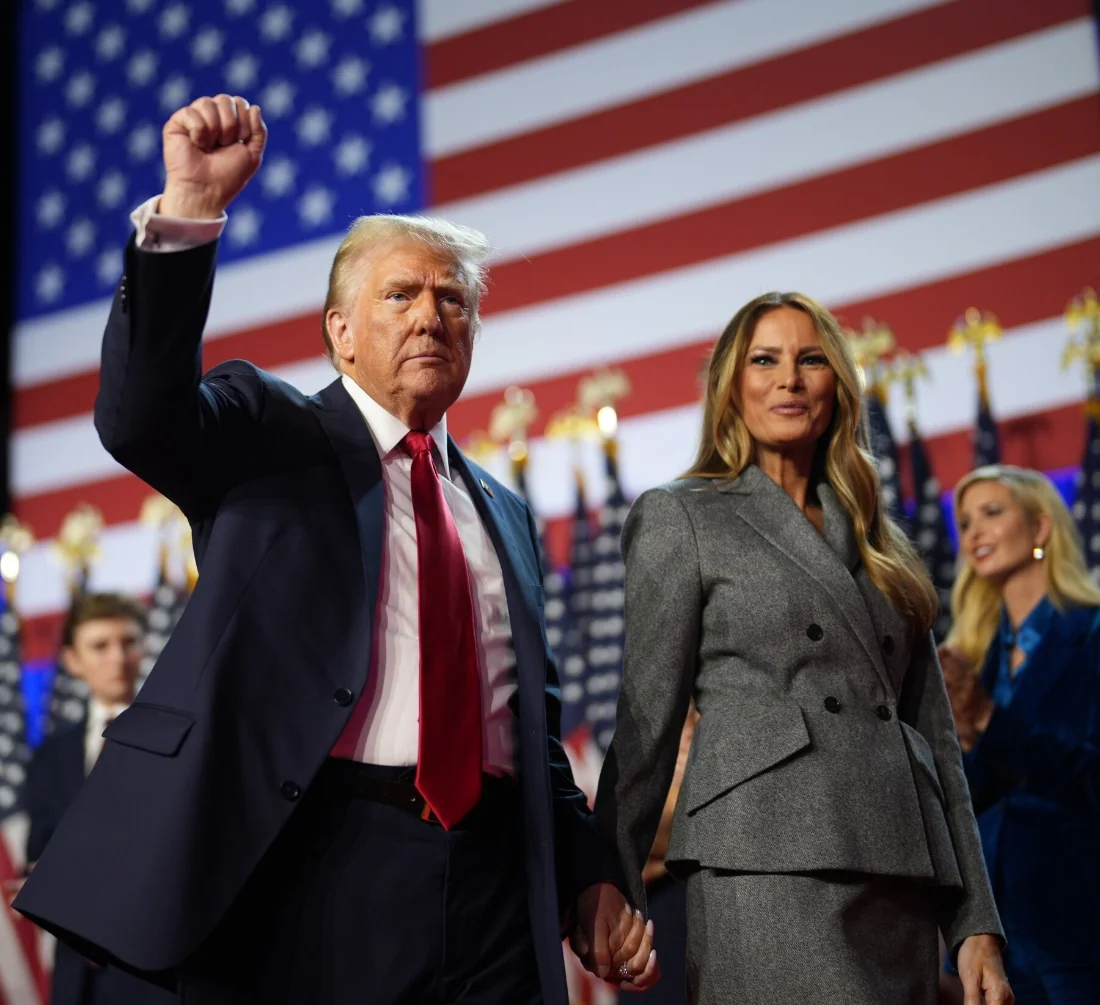
Donald Trump Defeats Kamala Harris to Become 47th President of the United States in 2024 Election
Fiona Nanna, ForeMedia News
7 minutes read. Updated 9:50PM GMT Thurs, 7th November, 2024
Donald Trump has secured the victory in the 2024 United States presidential election, marking his comeback as the 47th President. The election result was confirmed on Wednesday after a tense and fiercely contested battle against his Democratic opponent, Kamala Harris. The win is especially remarkable given Trump’s turbulent first term, which saw him impeached twice, incite a violent insurrection at the Capitol, and endure multiple legal challenges. But against all odds, Trump’s relentless political style won over enough voters to propel him back into the White House, where he will serve for a second non-consecutive term, effective January 20, 2025.
Trump’s path to victory was solidified after his win in Wisconsin, securing the 270 electoral votes needed to clinch the presidency. Unlike his 2016 election, where he won the Electoral College but lost the popular vote, Trump appears poised to achieve both a popular and an Electoral College win this time around, reflecting his broad appeal to a fractured electorate.
Throughout the campaign, Trump and Harris engaged in an intense verbal duel. Trump, known for his combative rhetoric, launched scathing attacks on his opponent, painting a picture of America as a nation on the brink of collapse due to immigration and left-wing policies. He frequently resorted to inflammatory language, which resonated with voters disillusioned by rising inflation and increasing consumer prices under the Biden administration.
Meanwhile, Harris, in response, decried Trump’s attacks as threats to American democracy, calling him a “fascist” and highlighting his divisive approach to governance. Despite this, Harris’s candidacy faltered as the economic struggles of ordinary Americans became a major factor in the electorate’s decision.
As Trump prepares to take office, his agenda is clear: he aims to radically overhaul the federal government, punish those he deems his enemies, and reinforce his “America First” vision. Trump’s supporters are already celebrating what he calls a “powerful and unprecedented mandate,” signaling that his presidency will be characterized by bold, often controversial moves.
Global Reactions to Trump’s Victory
Trump’s victory has not gone unnoticed on the global stage, with world leaders offering their congratulations and pledging to continue diplomatic relations with the United States.
Israel: Prime Minister Benjamin Netanyahu was among the first to congratulate Trump, lauding the victory as a new chapter for both Israel and the United States. Far-right Israeli ministers expressed enthusiastic support, highlighting the close ties between the two nations.
Qatar: Emir Sheikh Tamim bin Hamad Al Thani welcomed Trump’s return, emphasizing the importance of continued cooperation on global security issues.
Egypt: President Abdel Fattah el-Sisi expressed hope that Trump’s second term would lead to more stability in the Middle East, particularly in peace efforts.
Iran: While not directly commenting on the election, Iranian officials emphasized that their policies would remain unchanged regardless of who occupied the White House.
Palestine: Both Hamas and the Palestinian Authority called on the new administration to prioritize peace and stability for the Palestinian people. The situation in Gaza remains a central issue.
China: The Chinese government reiterated that its policies toward the United States would remain consistent, focusing on mutual respect and peaceful coexistence.
Taiwan: President Lai Ching-te of Taiwan expressed confidence that relations with the United States would continue to play a crucial role in regional stability.
Ukraine: President Volodymyr Zelenskyy expressed gratitude for Trump’s support of Ukraine, highlighting the importance of American backing in the ongoing conflict with Russia.
Russia: Kremlin officials were more cautious in their response, acknowledging Trump’s pragmatic approach but maintaining a critical stance toward U.S. foreign policy.
United Kingdom: Prime Minister Keir Starmer emphasized the enduring friendship between the US and the UK, noting their shared values and close ties.
NATO and the European Union: Both organizations reaffirmed their commitment to transatlantic cooperation, emphasizing the importance of maintaining strong alliances under Trump’s leadership.
Canada and Mexico: Leaders from both neighboring countries signaled their readiness to continue working with Trump, with Mexico expressing no immediate concerns about the change in leadership.
South Korea and Japan: Both countries reaffirmed their commitment to the U.S.-Asia alliance, emphasizing security and economic cooperation in the region.
Saudi Arabia and Turkey: Middle Eastern leaders, including Saudi Crown Prince Mohammed bin Salman and Turkish President Recep Tayyip Erdogan, offered congratulations, highlighting their desire to strengthen ties with the U.S. under Trump’s leadership.
India: Prime Minister Narendra Modi praised Trump’s victory, indicating that India looks forward to deepening cooperation in various strategic areas.
Africa: Leaders across the African continent, including Nigeria’s President Bola Tinubu and South Africa’s Cyril Ramaphosa, expressed optimism about future cooperation with the U.S. under Trump’s leadership.
Latin America: In countries like Brazil, Argentina, and Venezuela, leaders were cautiously optimistic, with some expressing hope for renewed cooperation and a focus on mutual respect.
Challenges Ahead for President Trump
As President Trump prepares to take office once again, he faces numerous challenges on both the domestic and international fronts. Domestically, the U.S. remains deeply divided, with rising political polarization, ongoing economic struggles, and debates over the future direction of the country. Internationally, the U.S. faces growing geopolitical challenges, particularly with China, Russia, and Iran, as well as ongoing conflicts in Ukraine and the Middle East.
Despite these obstacles, Trump’s supporters believe his approach to leadership—assertive, unyielding, and unapologetically nationalist—will steer the country toward a brighter future. Whether his policies can unite the country or deepen divisions will be a central question as he begins his second term in January.
Meta Description: Donald Trump has been elected the 47th President of the United States, marking a historic comeback. World leaders react to his victory as Trump prepares to lead through global challenges and political polarization.

